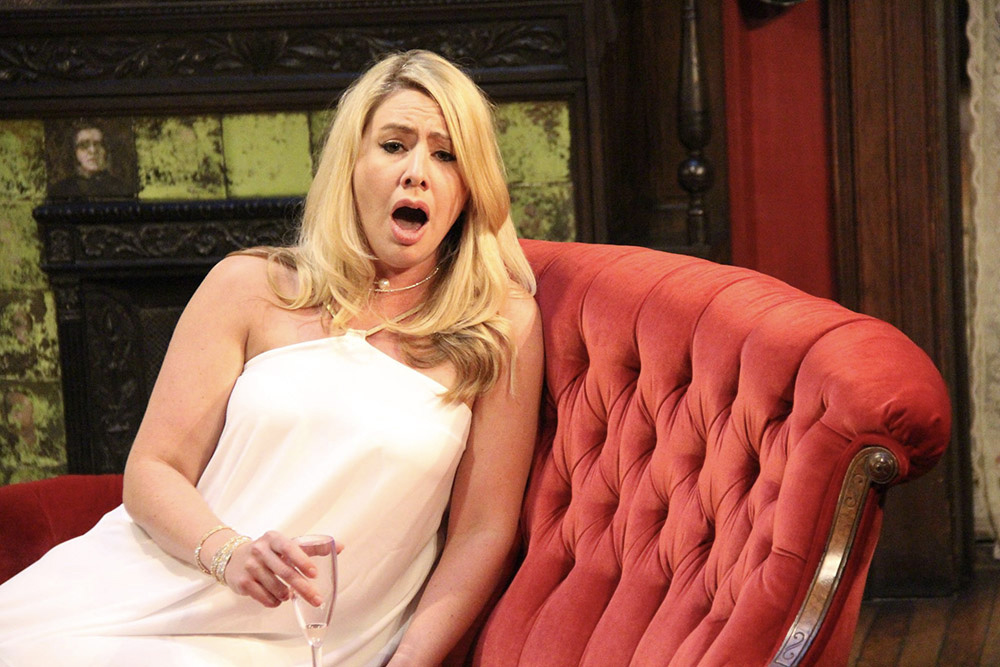How do you describe a performance that is unlike anything you’ve ever witnessed before?
I suppose I could use the word ineffable (“unable to be expressed in words”) to relieve myself of the burden of describing Marble City Opera’s production of Verdi’s La Traviata currently being performed in the 19th Century rooms of Knoxville’s Historic Westwood mansion. However, that’s not totally accurate—I can certainly lavish praise on the uniformly excellent cast headed by soprano Kathryn Frady in the role of Violetta Valery. I can mention the strange satisfaction of hearing the familiar work with singers and orchestra literally 10 feet away as one moves from room to room. I can describe the sensation of warm wood and muted colors—lit by practical lamps—punctuated by black, white, and dark crimson in an appropriately drafty, but beautifully immersive period space. I can go on at length about the preparation and amazing logistics that were obviously needed to successfully synchronize the opera’s action with an orchestra in one room and a cast that serves both as host and performer in other rooms. What is impossible to describe is the challenging experience that each member of the audience received by being drawn into an operatic world that is simultaneously theatrical and non-theatrical; personal, but also presentational; real and yet, oddly, unreal.
Admittedly, audiences and performers are accustomed to—and comfortable with—the dramatic distance that the traditional theatre experience affords, particularly with familiar works such as La Traviata. When the so-called “fourth wall” is removed and performers and audience mix in the same space, the proximity injects an entirely different burden onto dramatic performances and onto the audience’s ability to accept the action. While Marble City Opera’s raison d’être has been producing opera in whatever-is-available non-traditional venues—some theatrical and some not—this production takes that idea to its extreme. The production’s success lies solely in the willingness of an audience to factor in the environment and accept the exploration as an adventure. Thursday evening’s audience seemed inclined to make the necessary adjustments and be a part of the premise.
No adjustment was necessary, however, in gauging the accomplishment of Kathryn Frady as Violetta. Even without the safety buffer that distance and a proscenium offers, her voice works in close quarters, retaining the silky subtlety and delicacy to contrast with the requisite power the role demands. Her performance was dramatically personal and intensely musically satisfying.
Opposite Frady in the tenor role of Violetta’s lover, Alfredo Germont, was Brandon Evans. Evans mastered the range of the role, using a soothingly delicate falsetto to bring a sense of romance to the higher end .
Supremely impressive in the role of Alfredo’s father was Austin Kness, a baritone with an absolutely velvety rich voice with power to spare.
Also impressive was Megan Moore in the role of Flora, Violetta’s friend. Although the role was somewhat diminished by necessary cuts to the work in this production, she presented a solidly thought-out character. And, one was left yearning to hear more from this talented singer.
The uniformly strong cast was filled out by Brandon Gibson as Doctor Grenvil, Alexandria Shiner as Annina, Daniel Berry as Baron Douphol, and Breyon Ewing as Gastone. All singers pitched in for the retained chorus numbers supplemented by Marya Barry and Ryan Colbert. What would a production of La Traviata be without the famous “Libiamo ne’ lieti calici”?
Kudos to conductor Brian Holman for the impressive work of pacing and control of the action and miraculously maintaining the synchronization of the instrumental ensemble to the singers in different rooms. Kudos also to director Matthew Haney for figuring out the extraordinary logistics of movement.








